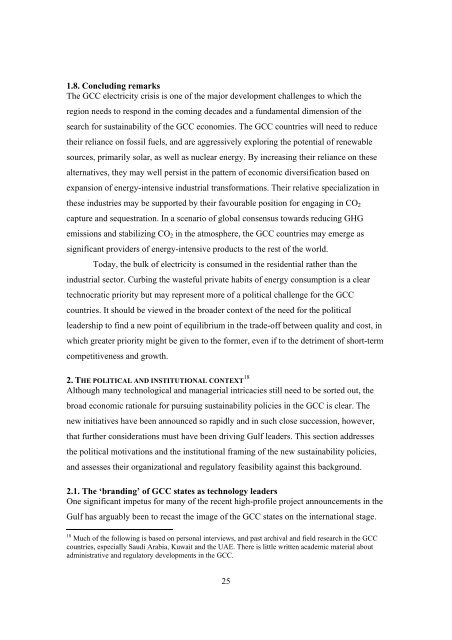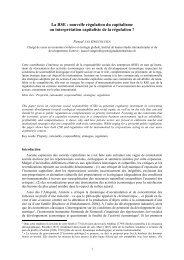PDF - Graduate Institute of International and Development Studies
PDF - Graduate Institute of International and Development Studies
PDF - Graduate Institute of International and Development Studies
Create successful ePaper yourself
Turn your PDF publications into a flip-book with our unique Google optimized e-Paper software.
1.8. Concluding remarks<br />
The GCC electricity crisis is one <strong>of</strong> the major development challenges to which the<br />
region needs to respond in the coming decades <strong>and</strong> a fundamental dimension <strong>of</strong> the<br />
search for sustainability <strong>of</strong> the GCC economies. The GCC countries will need to reduce<br />
their reliance on fossil fuels, <strong>and</strong> are aggressively exploring the potential <strong>of</strong> renewable<br />
sources, primarily solar, as well as nuclear energy. By increasing their reliance on these<br />
alternatives, they may well persist in the pattern <strong>of</strong> economic diversification based on<br />
expansion <strong>of</strong> energy-intensive industrial transformations. Their relative specialization in<br />
these industries may be supported by their favourable position for engaging in CO 2<br />
capture <strong>and</strong> sequestration. In a scenario <strong>of</strong> global consensus towards reducing GHG<br />
emissions <strong>and</strong> stabilizing CO 2 in the atmosphere, the GCC countries may emerge as<br />
significant providers <strong>of</strong> energy-intensive products to the rest <strong>of</strong> the world.<br />
Today, the bulk <strong>of</strong> electricity is consumed in the residential rather than the<br />
industrial sector. Curbing the wasteful private habits <strong>of</strong> energy consumption is a clear<br />
technocratic priority but may represent more <strong>of</strong> a political challenge for the GCC<br />
countries. It should be viewed in the broader context <strong>of</strong> the need for the political<br />
leadership to find a new point <strong>of</strong> equilibrium in the trade-<strong>of</strong>f between quality <strong>and</strong> cost, in<br />
which greater priority might be given to the former, even if to the detriment <strong>of</strong> short-term<br />
competitiveness <strong>and</strong> growth.<br />
2. THE POLITICAL AND INSTITUTIONAL CONTEXT 18<br />
Although many technological <strong>and</strong> managerial intricacies still need to be sorted out, the<br />
broad economic rationale for pursuing sustainability policies in the GCC is clear. The<br />
new initiatives have been announced so rapidly <strong>and</strong> in such close succession, however,<br />
that further considerations must have been driving Gulf leaders. This section addresses<br />
the political motivations <strong>and</strong> the institutional framing <strong>of</strong> the new sustainability policies,<br />
<strong>and</strong> assesses their organizational <strong>and</strong> regulatory feasibility against this background.<br />
2.1. The ‘br<strong>and</strong>ing’ <strong>of</strong> GCC states as technology leaders<br />
One significant impetus for many <strong>of</strong> the recent high-pr<strong>of</strong>ile project announcements in the<br />
Gulf has arguably been to recast the image <strong>of</strong> the GCC states on the international stage.<br />
18 Much <strong>of</strong> the following is based on personal interviews, <strong>and</strong> past archival <strong>and</strong> field research in the GCC<br />
countries, especially Saudi Arabia, Kuwait <strong>and</strong> the UAE. There is little written academic material about<br />
administrative <strong>and</strong> regulatory developments in the GCC.<br />
25




